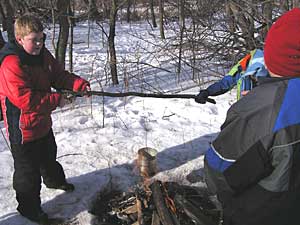|
Audio
Photos
|
February 7, 2005
 |
| Vicki Breneman's fourth grade class gets lessons in winter survival during a day at Moorhead's regional science center. (MPR Photo/Bob Reha) |
Moorhead, Minn. — It's 8:30 in the morning, and time for roll call in Vicki Breneman's fourth grade class. Today, the lesson will take everyone outside. But first Breneman runs down a check list of the necessities for today's field trip.
"OK. Everybody's got their lunches?" Breneman is all business in the face of a class of excited students. "Let's check the board. We've got lunches? Water jugs? Does everybody have their bowl, their cup, their spoon and gorp?"
Mrs. Breneman's fourth graders load into a bus and head off to Moorhead's regional science center for a lesson in winter survival.
"Good morning! Good morning," Tony Bormann says to the kids as he welcomes them.
Bormann is part teacher and part guide. The day's agenda includes cross-country skiing, snowshoeing and a course on maps and how to read a compass.
The first quiz of the day? How to find a location on the map.
"What you do is set your compass on how to get (to your destination)," says Bormann. "But does that mean you follow this trail?"
The kids pass the first quiz when they answer in unison, "no!"
They'll have to bushwhack through the trees to stay on their compass course rather than following the trail. It's one of the most important skills when it comes to orienteering in the wild.
While this group is busy, some of their classmates are with Mrs. Breneman. She's teaching the kids how to put on snowshoes.
One student has some trouble and Breneman, ever the teacher, doesn't budge.
"You're going to have to try, Danielle. Give it a whirl," Breneman says.
In the end, Danielle does just fine with some encouragement. "You're on, OK? Goodbye. Off you go," Breneman says.
The students are quick learners and soon they're scooting along on the snow. To some, it might seem like this field trip is an excuse to play hooky from school. But Vicki Breneman says what's happening here is real life learning.
"It (this lesson) includes science, social studies, culture, first aid and nutrition," she says. "It's things the kids can really apply, skills they'll use for the rest of their lives."
The morning passes quickly, and at lunchtime the kids rendezvous in the woods. But like everything in the wild, lunch requires some work. First the kids have to start a fire for cooking their meal.
"Hey you guys, don't dump all of our bark in there," says one fourth grader.
"Yeah, you have to save some. Stop," says another.
"Save some of it, because if our match goes out then we don't have any more," counsels yet another classmate.
Slowly, the pile of twigs and bark starts to smoke. Soon a flame appears and the fire crackles.
There are moments in the day when the truth slips out of even the most earnest of students.
"I can't believe she's letting us play with fire," says one of Vicki Breneman's students.
For lunch? The children scramble to find sticks to roast hot dogs. They come up with makeshift potholders to boil water. They toss in soup mix.
The kids are having a ball, but they're learning. Lucy Smith says if you want to stay warm in cold weather, you have to remember some basic things.
"You have to dress in layers because you might get frostbite, or if you don't dress really appropriate you might get hypothermia," Smith says.
Classmate Abbey Christiansen says if you get stranded or lost in the winter, it's best not to panic. She says, calmly, there are several things she's learned to do to stay warm.
"I could find wood, and I could make a fire and try to stay warm," she says. "I'd probably have some kind of food with me, and thaw it out by the fire and eat it. And if I had somebody with me, I'd try to stay close to them for body heat. We learned that."
Teacher Vicki Breneman has taught winter survival as part of her curriculum for the last 14 years. She's not sure if it's saved anyone's life, but sometimes years later, former students tell her it's one of the most memorable and valuable classes they had from her.







